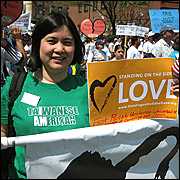UU congregations work for immigrant justice
Unitarian Universalists find many ways to help immigrants.
The topic of immigration has special urgency now. In June, the Unitarian Universalist Association’s General Assembly selected immigration reform as the new four-year Congregational Study/Action Issue and resoundingly endorsed holding a special “justice” General Assembly focused on immigration issues in Phoenix, Ariz., in 2012. Unitarian Universalists were prominent at recent demonstrations in Phoenix against Arizona’s Senate Bill 1070, a new anti-illegal immigration law that took effect at the end of July. (See the sidebar for links to UU World’s coverage of General Assembly and the Arizona protests.)
Leslie’s own congregation, First Parish in Cambridge, Mass., holds “Grace Margins Conversations” with immigrants and people who represent immigrant communities. “We have conversations with them about the challenges they face, including spiritual ones. It’s not as much a forum where they talk to us, as much as it is a time for quiet conversation and listening.” They've held two conversations so far: one in February and one in June, with approximately 30 people participating each time.
Leslie added, “This is exciting work. We did a forum with a Haitian coalition after the earthquake there. Having this conversation helped us understand their issues and they felt supported by us. There are so many people who live in the margins of our communities. Finding out who they are and making them feel acknowledged is so important.”
The Unitarian Universalists of Clearwater, Fla., have a longstanding history of working with immigrant groups. They have supported the Coalition of Immokalee Workers, immigrants who pick tomatoes in southern Florida, for more than a decade. Church members have joined protests at local supermarkets and corporation headquarters, written letters, marched in support of farm workers, and supported them financially and emotionally.
The congregation has also mobilized around the issue of forced labor, helping the farm workers, mostly from Central America and Mexico, expose situations of near-slavery. (See UU World’s story on modern slavery, “Bitter Harvest,” Nov./Dec. 2004.)
“What has worked best for us,” said Linda Stoller, chair of the congregation’s economic justice team, “is when we function in a support capability in this work. The farm workers tell us what they want to do and we look at ways we can support that.”
The Clearwater congregation’s minister, the Rev. Abhi Janamanchi, said the work with the farm workers has changed the congregation over the years. “It has really brought home the different situations under which immigrant farm workers have to operate and survive, and also the tremendous grit and determination that helps them get through those situations. It has not only raised our awareness but deepened our own commitment to this work.”
The congregation has had the added experience, he noted, of witnessing his own struggle for citizenship, coming to the United States from India and enduring many “dehumanizing experiences” in the immigration process. “As I have journeyed through the process, the congregation has accompanied me,” he said. “As a result there has always been a deeper awareness here of a broken immigration system.”
The Social Action Committee of the Unitarian Universalist Fellowship of Wilmington, N.C., supports immigrants locally through two programs. For the past several summers it has collected book bags and school supplies for the school migrant program in a neighboring county, which has a large population of migrant families. Through another program it provides basic household supplies to immigrant families.
Angela Ferguson is an immigration attorney and a member of All Souls UU Church in Kansas City, Mo. She encourages UUs to work to change the system by lobbying city hall, their state legislatures, and Congress. She knows that lobbying can defeat anti-immigrant legislation because she was part of such an effort in Jefferson City, Mo., where one of the architects of the Arizona legislation tried and failed to get a similar measure passed.
Start by getting educated, she said. “If there is a federal immigration court in your city, go and see it. Just be a presence. Watch a trial or a docket call, where the court schedules a large number of people for deportation.” She said whenever she speaks before a group she tries to take someone with her who can share a personal story. “It often takes one-on-one knowledge of immigrant families to get someone to change their mind.”
Frame the immigration debate as a practical problem, not a political one, says the Rev. Bret Lortie, minister of the First UU Church of San Antonio, Tex. The congregation holds “immigration academies” with other faith groups. “We sit down with immigrant families and talk about all of our experiences.” He said probably one-fourth of the 400 members of the congregation are involved in immigration issues.
He said his congregation has changed over time on immigration. “When I first started addressing the issue I was surprised by the number of people who came to me and said, ‘This doesn’t affect me and I’m not interested.’ That’s not the case now. We’ve talked about how we all come from immigrants. Many people are trying to learn Spanish. This is the issue of our time.”
See sidebar for links to related resources.








